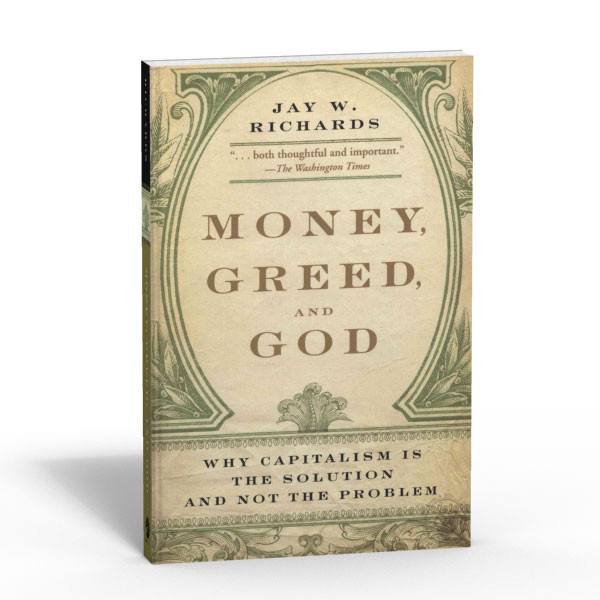In Money, Greed, and God: Why Capitalism is the Solution and Not the Problem, Senior Fellow at the Discovery Institute Jay W. Richards and bestselling author of Indivisible: Restoring Faith, Family, and Freedom Before It’s Too Late and Infiltrated: How to Stop the Insiders and Activists Who Are Exploiting the Financial Crisis to Control Our Lives and Our Fortunes defends capitalism within the context of the Christian faith, revealing how entrepreneurial enterprise, based on hard work, honesty, and trust, actually fosters creativity and growth. In doing so, Money, Greed, and God exposes eight myths about capitalism, and demonstrates that a good Christian can be a good capitalist.
-
Quote: “American capitalism had produced gross inequalities between rich and poor.” (13)
-
Quote: “Lord, grant me the serenity to accept the things I cannot change, the courage to change the things I can, and the wisdom to know the difference.” (27)
- Note: As people, we are too worried about having a lot of things and having the latest thing to impress people. We need to worry more about caring for the poor as opposed to trying to spend all the money that we earn.
- Note: It is important not to get stuck in a revolutionary rhetoric. This becomes tempting because those who are involved become enthusiastic with their strong words as opposed to having their actions speak for themselves.
-
Quote: “Our minds and our motives aren’t isolated compartments.” (35)
-
Quote: “If anything, welfare has been a cultural wrecking ball in America’s poorest communities.” (55)
- Note: When it comes to taking responsibility, the government should be the last resort. When it finally reaches the government, the person or problem becomes more generic. This in turn can create more problems.
- Note: People have had the thought that when it comes to private charities, the government should help so that they have more cushion. However, when the government enters these private places, they tend to change the original mission.
- Quote: “Economic value is not only in the eye of the beholder; the beholder’s eye can see things differently in different circumstances.” (67)
- Quote: “My ultimate value in the eyes of God is not the same as my economic value.” (68)
- Note: Trading, even though the items don’t physically change, adds value because the person who receives it desired the item and vice versa with the opposite end. This especially works when there are rules set up beforehand.
- Note: Labor adds value to a product when it creates something that the person wanted. However, economic value doesn’t come from labor.
-
Quote: “Most of us know perfectly well that socialist solutions are worse than the disease.” (83)
-
Quote: “My wealth needn’t cause your poverty.” (104)
- Note: Relative poorness is being poor in relation to other people. For example, a lot of people would be considered poor in comparison to Bill Gates but are still well off and have more than they need.
- Note: 2.46% of people who are considered to be “poor” in the United States actually own their own homes. Only 6% of poor households are overcrowded.
- Quotes: “Greed, or ‘avarice,’ is one of the seven most deadly sins, and the Bible has nothing good to say about it.” (111-112)
- Quote: “Great entrepreneurs succeed by anticipating and meeting the desires of others.” (127)
- Note: There can definitely be greed within capitalism, but the system itself does not run on people’s greed.
- Note: The capitalist system runs on self-interest that corresponds with the Golden Rule, which is, “Do unto others as you would do unto yourself.”
-
Quote: “For centuries all the greatest Christian theologians and philosophers believed that charging interest on money was an egregious sin — called usury.” (136)
-
Quote: “Armed with solid statistics, Stark also argues that nations that protect property rights, individual freedom, and freedom of religion — like the United States — actually encourages religiosity more than do those countries — like most of Europe — that have state churches and less regard for private property and individual rights.” (151)
- Note: Charging interest has been for many decades considered usury and wrong for Christians to do; there are also some Scripture passages that speak against it. The book debunks this theory for modern economics because it looks into the contextual setting of charging interest mentioned in the Bible.
- Note: It is an easily held belief that capitalism should not be a part of the Christian life. One of the best defenses that the book gave to this kind of thinking was the parable of the talents. This parable clearly puts investing and economic growth as a good thing.
- Quote: “Too many critics confuse the free market with the bad choices free people make.” (164)
- Quote: “Every social ill in modern-day America, from widespread abortion and alcoholism to family breakdown, was much worse in statist and communist countries.”
- Quote: This chapter addressed the idea that capitalism leads to consumerism. Though capitalism encourages market growth and more production with the free economy, it cannot determine the hearts of the people within the market.
- Note: Because capitalism gives us freedom to choose and exchange, people have the opportunity to be avid consumers, but even God gave us the ability to choose. It was the one doing the choosing that sinned, not the one who allowed us to have free choice.
-
Quote: ”Although we may own legal property, God holds the ultimate title on everything.” (185)
-
Quote: “If we keep the long-term past trends in mind rather than just our little slice of time, we should expect scarcity and creativity to conspire in the future, as they have in the past.” (193)
- Note: The law of supply and demand can actually save natural resources. If something truly becomes depleted, it will become too costly to use anymore in the economy and human invention or alternative sources will replace the original source.
- Note: If we look at history and how new resources and ways of discovering resources has evolved, we can feel confident that “man’s principle resource is man himself.” (207)

